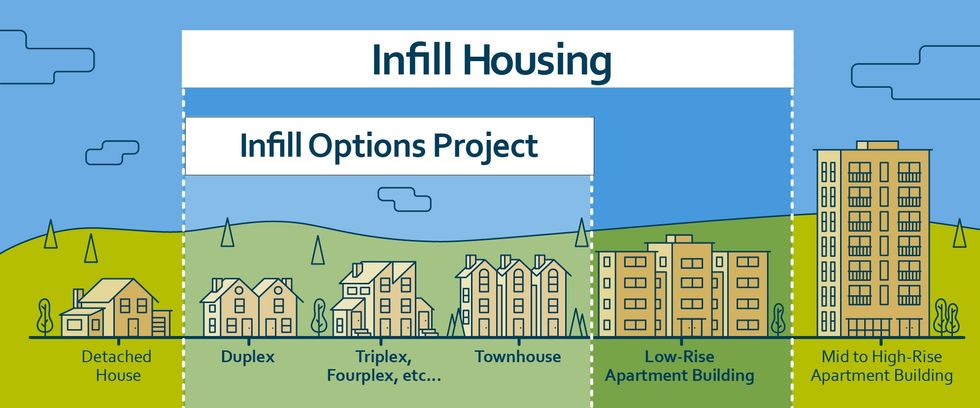On Wednesday, federal Minister of Housing Sean Fraser was in Kelowna to announce that the Government of Canada is approving the City's application for funding via the Housing Accelerator Fund.
The agreement will see the City of Kelowna receive $31.5M to "fast track an additional 950 housing units over the next three years" and "create a potential for up to 20,000 additional homes over the next decade."
The funding will go towards eliminating barriers to building housing, allowing higher-density development along rapid transit corridors, making City-owned lands available for affordable housing development, and expanding the use of technology to streamline building permit applications — all of which are in reference to various City of Kelowna initiatives.
In the announcement, the federal government specifically commended Kelowna for its work on infill housing.
"Kelowna has been a leader in infill housing and is committed to expanding as-of-right zoning for more infill housing in its core," it said. "These initiatives are going to significantly improve access to housing in Kelowna."
The City of Kelowna has taken a progressive approach to infill housing, beginning in 2016 through the Infill Options Project, with now over 800 parcels in specified areas of the city permitted to develop up to four residential units per lot. Through that project, the City has committed to pre-zoning large areas of the city core to permit infill housing. The federal government's announcement on Wednesday notes that the Housing Accelerator Fund money is conditional on Kelowna City Council's approval of pre-zoning measures.
The project just completed public engagement earlier this month and is expected to be implemented by the end of the year.

According to the City, 80% of Kelowna's growth is taking place on just 20% of developable land. Ninety percent of residential land in core area neighbourhoods is zoned to allow only single-family homes, and only 10% of Kelowna's growth is occurring outside of city's urban centres.
The City recently completed its Housing Needs Assessment, which found that Kelowna currently has a deficit of 3,750 to 5,000 units and an anticipated future demand (by 2031) of between 13,650 and 20,130 units.
Kelowna, like many other large cities, also has its own homelessness crisis, to the point that the City parted ways with the organization it tasked with alleviating the problem and is taking the reins themselves. The City recently signed a memorandum of understanding with the Province of British Columbia to "better support people who are unhoused, sheltering in encampments, and to help prevent encampments in the future."
The partnership is expected to deliver new shelter and housing options, "a more coordinated approach to outreach and support services," and expedited processes regarding shelter and supportive housing projects.
"Everyone deserves a place to call home, that’s why increasing diverse, attainable, and affordable housing options is one of Council’s top priorities," said Kelowna Mayor Tom Dyas on Wednesday. "We are grateful for the Government of Canada's significant investment that will further advance Kelowna’s innovation and commitment to accelerate housing for our rapidly growing community. The Housing Accelerator Fund is key to propelling us forward to meet the needs of today and into the future."
The Housing Accelerator Fund was first announced in 2021 but did not officially launch until earlier this year. Cities that have received funding so far include London, Vaughan, Hamilton, Brampton, and Halifax. Earlier this week, Minister Sean Fraser also released a list of best practices that would greatly contribute towards cities getting their applications approved.





















